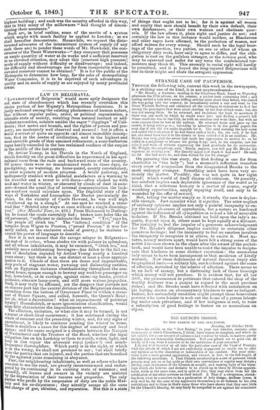STRANGE CASE OF PAUPERISM.
THOUGH the following tale, current this week in the newspapers, is a striking one of its kind, it is not unprecedented- " Mr. Brooks, a fruiterer, residing in the Edgevvare Road, found on Thursday afternoon the 27th ulthno, on his counter, a pocket-book containing 500/ ; and having served a lady with some trifling articles some short time before, who stated she was going into the country, he immediately called a cab and went to the Great Western Railway and examined all the carriages to endeavour to find her among the passengers that were about starting by the four o'clock train: but she was not among them. So he returned, and examined the book to ascertain if there was any mark by which he might trace her; and finding a grocer's bill whose residence was in the City, he took an omnibus and went there, but with no more success than he had at the railway. He returned home and gave up the search, it being seven p.m.; intending to advertise it in the public papers the next day if she did not make inquiries for it. The next morning the lady came and asked the tradesman if he had found such a book; for, she said, if he had not, she must have lost it in the streets or been robbed of it in an omnibus. Mr. Brooks was very glad the owner had made her appearance to receive it; so he called in a neighbour to witness his giving it up; and, to his surprise, saw her take it and walk off without expressing the least gratitude for its restoration. Mr. Wright, the neighbour, said, Surely, madam, you will pay Mr. Brooks his expenses in seeking you.' She directly asked how much it had cost? He said, 2s. W. She laid down 38., and then waited for the 9d. change."
On perusing this true story, the first feeling is one far from charitable to "the lady "; but a moment's reflection transfers every sense of compassion from the disappointed Brooks to the more unhappy stranger. Something must have been very se- riously the matter. Possibly, she was not quite in her right mind ; which would of itself disarm all criticism. Or possibly, her conduct implies such deplorable ignorance of the world as to think that a solicitous honesty is a matter of course, eagerly watching opportunities, amply repaying itself, and only to be wounded by the offer of reward.
But, taking the matter simply as it stands, the case is deplor- able enough. Just consider what it signifies. The utter neglect of ordinary opinions implies not only a painful incapacity to en- joy the usual pleasures of approbation, but a nature so hardened against the influence of all sympathies as to lead a life of miserable isolation. If Mr. Brooks obtained no hold upon the lady's re- gards, depend upon it, others must be kept equally at a distance. The inability to feel the impulse of a generous acknowledgment for Mr. Brooks's diligence implies inability to entertain other generous feelings; but the incapacity to feel an emotion involves the incapacity to recognize it in others, to excite it. Most na- tures, money matters apart, would have felt a strong sense of the active kindness shown in the chase after the owner of the pocket- book, and would have been unable to resist the impulse to recipro- cate that kindness in some distinct expression : the anomalous lady seems to have been incompetent to that modicum of kindly warmth. Now these deficiencies of natural function imply also biographical facts,—a solitary life, one hardened against the sense of affection, unvisited by the solaces of affection. There seems to be no lack of money, but a distressing lack of those blessings which money will not purchase. It is evident that, for all her 5001., the plimnomenon in petticoats that entered the shop of the worthy fruiterer was a pauper in regard to the most precious riches ; and Mr. Brooks must have reflected with satisfaction on his having shown an eleemosynary kindness to one so indigent. Indeed, her melancholy condition might prompt those benevolent persons who have leisure to seek out the home of a person labour- ing under such privations, and if her indigence is real, to raise a subscription of good feelings to bestow on so necessitous an object.
























 Previous page
Previous page